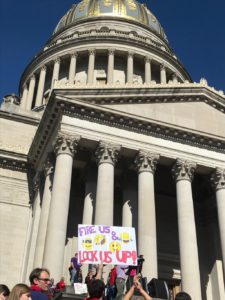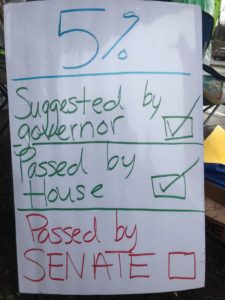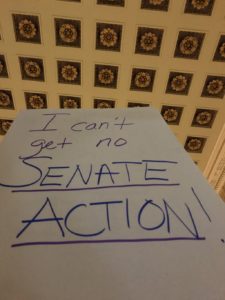
With the exception of three years, all my K-12 education was in West Virginia. Yes, West Virginia, not western Virginia. I cannot tell you how many people I’ve met since I moved to the Midwest who don’t realize West Virginia (WV) is its own state as they joke that I must be uneducated and married to my cousin (insert eye roll). Unfortunately, too many people attach stereotypes to my beloved WV, which made the positive news coverage of the 2018 teacher strike even more wonderful. People were finally saying something positive about West Virginians.
I followed the news from Indianapolis, saw status updates on various family and friends’ social media accounts, and talked to my parents, both native West Virginians, about it. However, my greatest insight came from chatting with one of my best friends from childhood, Ashley Stewart, who is currently a teacher in our hometown, Morgantown, WV.

Ashley started teaching Spanish in a local middle school in Morgantown in the fall of 2012 after spending two years teaching abroad in Spain. Ashley has her Master of Arts in Education from West Virginia University (WVU), also located in Morgantown, and is currently pursuing her Doctorate in Instructional Design & Technology from WVU. In addition to completing her Doctorate program coursework, Ashley works full-time as the Technology Integration Specialist and Academic Coach while also raising her almost 9 month old son with her husband Craig.
Here is a summary of our conversation:
Me: What was the nine-day strike about?
Ashley: It was a movement that was the result of an education crisis. It wasn’t just about health care or pay for teachers. But, health care was part of it. WV borders five states, and we are concerned that we are continually losing teachers to those states, even if they live in WV. Previously, one of the benefits of being a teacher in WV was the health care benefits, but that’s not true anymore. Premiums keep rising and benefits keep getting worse. The last pay raise was in 2014, and pay is so low in some counties that teachers receive food stamps due to health conditions and the resulting high costs.
There are currently more than 700 teaching vacancies in the state. One of the proposed solutions from the WV Legislature was to lower teacher qualifications to fill these vacancies. They wanted to eliminate the bachelor’s degree requirement for teaching and allow anyone who could pass the Praxis exam for a certain subject to teach without having any experience in teaching and, possibly, any experience in the subject they would teach.

Me: When did you realize a strike was imminent?
Ashley: In January because all state employees received a letter about Go365, which was advertised as “voluntarily”. However, if you chose not to participate, your deductibles would go up $500 and premiums at least $25 (based on salary tiers). My monthly premiums were going to go up 40% in addition to co-pays being adjusted on prescription medication with less coverage. When my parents [who were both public educators– her dad a principal of a local elementary school and her mom a Speech-Language Pathologist] retired, they were eligible to keep their health care coverage for several years because of their banked unused sick days. It’s no longer that way, and my parents, as well as all other state retirees under Public Employee Insurance Agency (PEIA), were negatively impacted by the changes.
Me: What was it like to be part of a state-wide teacher’s strike?
Ashley: I got in touch with my WV roots and worked in a different form. WV has a history of labor unions, especially with coal miners, and my great-grandfather was a coal miner, so my grandfather grew up in a coal mine camp. It was good to remember the importance of standing up for human rights, connect more deeply with my family history, and be more involved politically. I now know my State Senators, follow WVLegislature on Twitter, and I don’t want to get disengaged because the strike was history repeating itself.

It was stressful. The night before it ultimately ended, I broke down crying because I didn’t know how much longer it would last since the Senate was stalling. I went to Charleston for four of the nine days of the strike, including the day before the strike ended. When I wasn’t in Charleston, I was picketing in Morgantown.
In Charleston, everyone was chanting because we literally had to be heard. If you watched the live feed of the Senate those days, you could hear chanting in the background. The signs of teachers in Charleston were highlighting the injustices more.
In Morgantown, it was encouraging because we would be picketing at popular intersections, and people would honk, stop, and give us food. Current and former students filmed for a documentary and even sang songs to us. Support actually increased as time went on, which I didn’t expect.

Me: What’s next for teachers in WV?
Ashley: That’s a good question. It started with teachers and other public employees, but this strike was a movement for communities. I think it’s about WV as a whole—the economy (severance tax and corporations coming into the state), our state history of labor unions, local politics, and voting for representatives at all levels who will listen to the voice of the people they serve in the November 2018 election.
Me: What are the repercussions for other states, like Oklahoma (OK)?
Ashley: People are calling it a grassroots movement, and I think it’s a sentiment of the current political climate in our country. I’ve already seen the hashtag 77strong for OK and a sign of a teacher in Kentucky (KY) holding a sign that said, “Don’t make us go all WV on you.” Similar to the Women’s March and #MeToo movement, this was primarily led by women. The WV Legislature is mostly white males, and after day 4, our union leadership made a deal with the governor and told us to go back in good faith, saying “tomorrow is a cool down day.” As teachers, we said, “Wait. What? No.” So in a way, we even defied our union leaders and said we’re going to keep going. It’s been refreshing to see WV in a positive light in national news, and I’ve continued to see more coverage on national news of teaching salary and cost of living.
*All photos were shared with me by Ashley Stewart.









